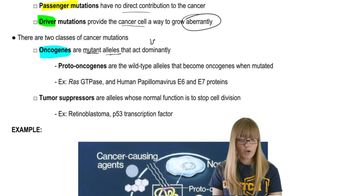Table of contents
- 1. Introduction to Genetics51m
- 2. Mendel's Laws of Inheritance3h 37m
- 3. Extensions to Mendelian Inheritance2h 41m
- 4. Genetic Mapping and Linkage2h 28m
- 5. Genetics of Bacteria and Viruses1h 21m
- 6. Chromosomal Variation1h 48m
- 7. DNA and Chromosome Structure56m
- 8. DNA Replication1h 10m
- 9. Mitosis and Meiosis1h 34m
- 10. Transcription1h 0m
- 11. Translation58m
- 12. Gene Regulation in Prokaryotes1h 19m
- 13. Gene Regulation in Eukaryotes44m
- 14. Genetic Control of Development44m
- 15. Genomes and Genomics1h 50m
- 16. Transposable Elements47m
- 17. Mutation, Repair, and Recombination1h 6m
- 18. Molecular Genetic Tools19m
- 19. Cancer Genetics29m
- 20. Quantitative Genetics1h 26m
- 21. Population Genetics50m
- 22. Evolutionary Genetics29m
19. Cancer Genetics
Cancer Mutations
Problem 27a
Textbook Question
What evidence indicates that mutations in human DNA mismatch repair genes are related to certain forms of cancer?
 Verified step by step guidance
Verified step by step guidance1
<span>Step 1: Understand the role of DNA mismatch repair (MMR) genes. These genes are responsible for correcting errors that occur during DNA replication. If these errors are not corrected, they can lead to mutations.</span>
<span>Step 2: Recognize that mutations in MMR genes can lead to a failure in the repair process, allowing errors to accumulate in the DNA. This accumulation of errors can disrupt normal cell function and lead to cancer.</span>
<span>Step 3: Identify specific cancers associated with MMR gene mutations. For example, Lynch syndrome, also known as hereditary nonpolyposis colorectal cancer (HNPCC), is linked to mutations in MMR genes such as MLH1, MSH2, MSH6, and PMS2.</span>
<span>Step 4: Examine the evidence from genetic studies. Research has shown that individuals with inherited mutations in MMR genes have a higher risk of developing certain types of cancer, particularly colorectal cancer.</span>
<span>Step 5: Consider the use of genetic testing and family history analysis in identifying individuals at risk. Genetic testing can detect mutations in MMR genes, allowing for early intervention and management of cancer risk.</span>
Recommended similar problem, with video answer:
 Verified Solution
Verified SolutionThis video solution was recommended by our tutors as helpful for the problem above
Video duration:
2mPlay a video:
Was this helpful?
Key Concepts
Here are the essential concepts you must grasp in order to answer the question correctly.
DNA Mismatch Repair (MMR)
DNA mismatch repair is a cellular mechanism that corrects errors that occur during DNA replication. It involves a series of proteins that recognize and repair mismatched base pairs, ensuring genomic stability. Defects in this system can lead to an accumulation of mutations, which may contribute to cancer development.
Recommended video:
Guided course

Repair Pathways
Mutations and Cancer
Mutations are changes in the DNA sequence that can disrupt normal cellular functions. Certain mutations, particularly in genes that regulate cell growth and division, can lead to uncontrolled cell proliferation, a hallmark of cancer. Understanding the types of mutations associated with specific cancers helps in identifying genetic predispositions.
Recommended video:
Guided course

Cancer Mutations
Epidemiological Evidence
Epidemiological evidence refers to data collected from populations to study the relationships between genetic factors and disease incidence. Studies have shown that individuals with inherited mutations in MMR genes, such as MLH1 and MSH2, have a higher risk of developing cancers like Lynch syndrome, highlighting the link between these mutations and cancer susceptibility.
Recommended video:
Guided course

Evolution

 4:50m
4:50mWatch next
Master Cancer Mutations with a bite sized video explanation from Kylia Goodner
Start learningRelated Videos
Related Practice

